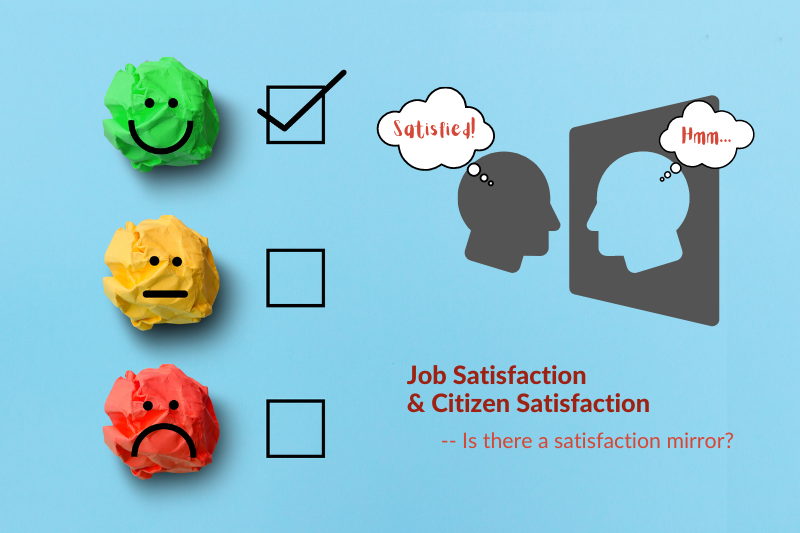
Enhancing Social Capital for Healthy Ageing by Timebanking System
31 August 2022
Quality Trilingual Caretaker Input Facilitates Early Trilingual Development
31 August 2022Job Satisfaction Effect on Citizen Satisfaction: A Study of the Satisfaction Mirror in the Public Sector

Principal investigator: Dr Nick PETROVSKY (Department of Public and International Affairs)

In the private sector, high job satisfaction in employees can bring many benefits to the company. Satisfied employees are less likely to leave and achieve higher productivity at work. In retail, catering and service sectors, happy employees can help promote the brand and deliver a pleasant experience to customers, which in turn enhances customer satisfaction. This “satisfaction mirror” is the result of better employee performance (indirect satisfaction mirror) and emotional contagion between employees and customers (direct satisfaction mirror). Private sector studies have found broad support for the “satisfaction mirror” hypothesis. However, there is still no direct, individual-level evidence of the existence of a “satisfaction mirror” in the public sector.
To assess whether the “satisfaction mirror” hypothesis also applies in the public sector, Dr Nick PETROVSKY, Associate Professor of CityU’s Department of Public and International Affairs recently published a research article entitled “Job Satisfaction and Citizen Satisfaction with Street-level Bureaucrats: Is there a Satisfaction Mirror?” with Ge XIN and Jinhai YU in the Journal of Public Administration Research and Theory. They conducted an original survey of village officials in small, rural Chinese villages, and local citizens interacting with them. Survey data for job satisfaction of 96 village officials and satisfaction of 949 citizens with these village officials’ work in 2019 were collected to test the connection between job satisfaction and individual citizens’ satisfaction with these village officials’ work, supporting the “satisfaction mirror” hypothesis.
Village officials represent a significant group of street-level bureaucrats in China. They are charged with delivering nearly all types of public services to citizens; these include social welfare provision, road maintenance, farmland management, and local fees collection. Village officials represent what governments look like in the eyes of most citizens in the village. A survey was conducted to measure the job satisfaction of village officials. A second survey of citizens captured their satisfaction level with the village officials whose job satisfaction had been measured. To test the indirect version of the “satisfaction mirror” hypothesis, the citizen survey also included six questions about the work of village officials, such as clarity of explanation, experience, politeness, interest, responsiveness, and fairness.
To carefully isolate partial correlations consistent with the satisfaction mirror while controlling for other factors, the research team estimates a structural equation model (SEM). A set of demographic variables including age, gender, education, income, family size, and years of residence, was applied as control for both village officials and citizens. An expectation gap is included to measure the differences between the expected and perceived job performance of village officials reported by citizens. The results of the SEM estimation reveal that both overall job satisfaction and job performance show positive and statistically significant effects on citizen satisfaction, supporting the combined effect model of the “satisfaction mirror” hypothesis. Furthermore, when job satisfaction is measured with two factor scores (Factor 1 represents resources and human relational support, while Factor 2 represents opportunities for growth and discretion in decision making), it is observed that external job satisfaction and internal job satisfaction are equally important in driving the “satisfaction mirror” effects.
Next, causal mediation analysis was conducted as an alternative to the SEM estimation. It includes a sensitivity test to show how the estimated effects vary by alternative assumptions. A list experiment was then conducted to assess potential social desirability bias. The survey data suggests that there is consistent empirical support for both the direct and indirect versions of the “satisfaction mirror” hypothesis in the public sector, despite the consideration of potential social desirability bias in the citizen satisfaction measure. The findings have rich implications for theory and practice. The present study suggests a fruitful approach to bridge job satisfaction and citizen satisfaction, bringing insights from organisational behaviour research into the study of citizen-state relations.
The research project led by Dr Petrovsky is the first study to provide individual-level evidence of a “satisfaction mirror” in the public sector. Future research is recommended to undertake a comprehensive, integrated test of the antecedents of job satisfaction and downstream consequences of citizen satisfaction. For instance, scholars can focus their research on how the quality of human resource management influences employee job satisfaction and thus citizen satisfaction. Future research may also explore how citizen satisfaction in turn affects the job satisfaction and performance of street-level bureaucrats. As satisfied village officials “make” satisfied citizens, it implies that more resources ought to be allocated to increase the psychological wellbeing of these street-level local officials. The research design can be extended to contexts with variation in external determinants of street-level bureaucrat satisfaction, such as job autonomy and goal complexity.
Achievements and publication
Petrovsky, N, Xin, G & Yu, J 2022, ‘Job Satisfaction and Citizen Satisfaction with Street-level Bureaucrats: Is There a Satisfaction Mirror?’, Journal of Public Administration Research and Theory. https://doi.org/10.1093/jopart/muac022 (open access)
